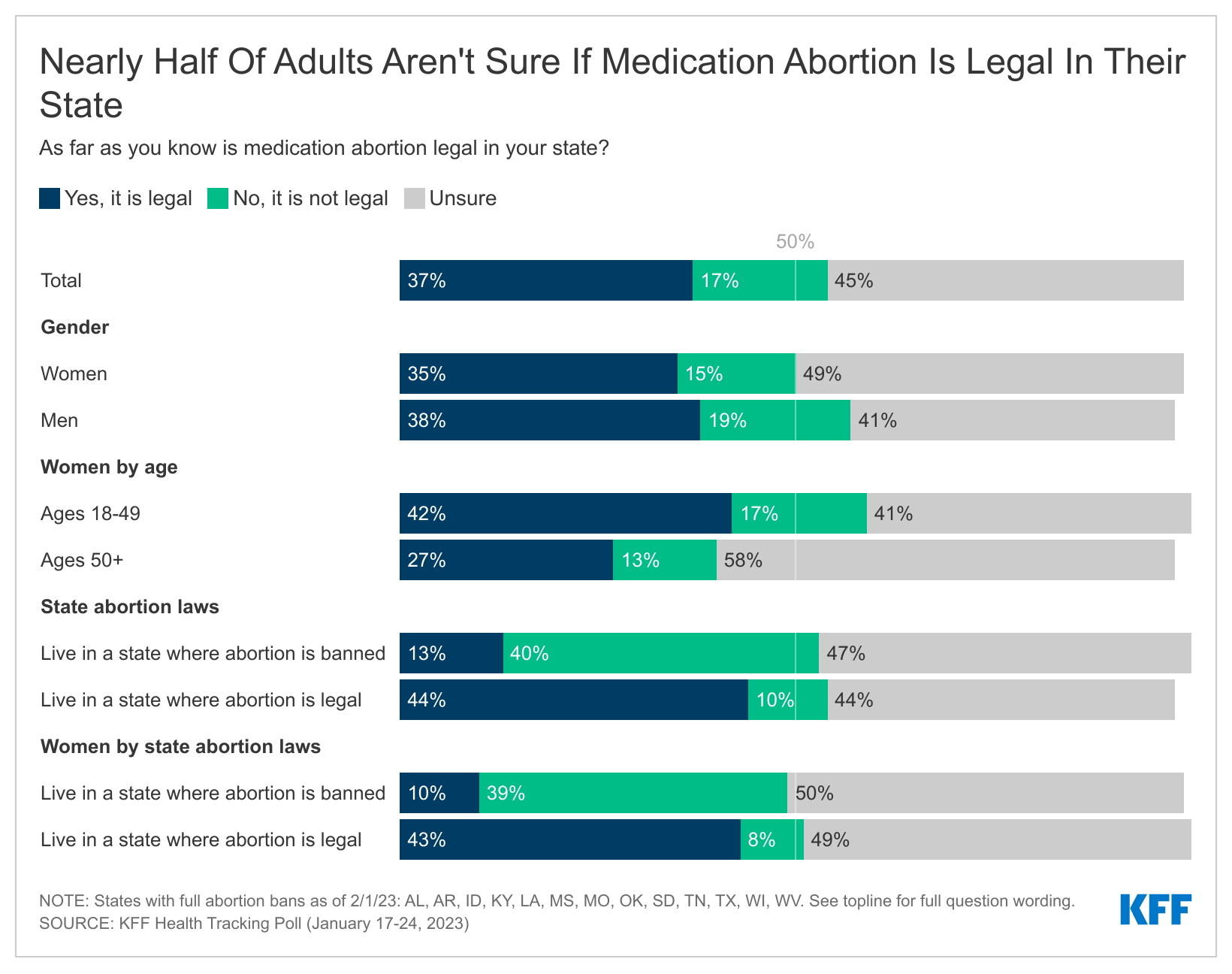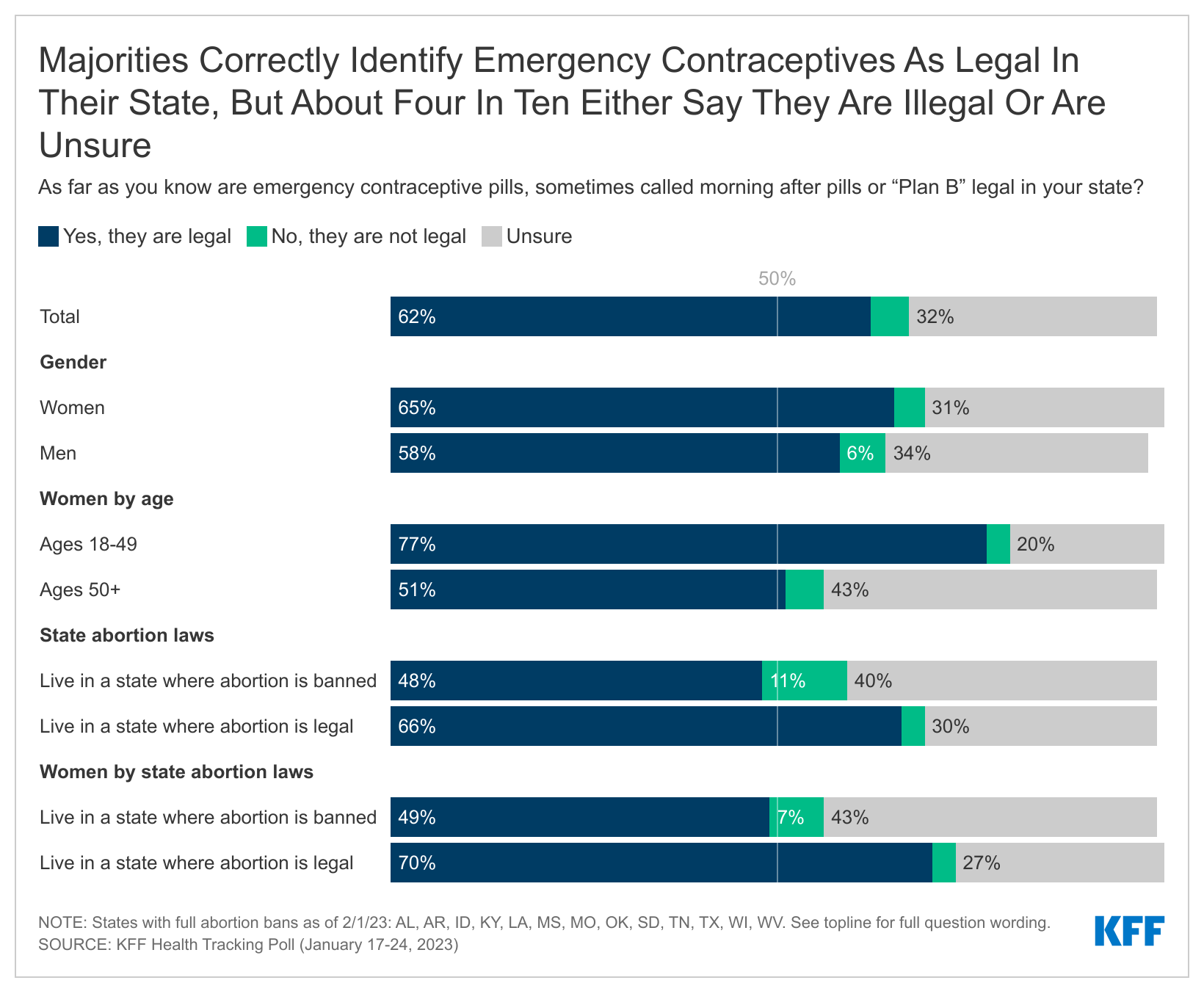
The independent source for health policy research, polling, and news.
The Public, Including Women of Childbearing Age, Are Largely Confused About the Legality of Medication Abortion and Emergency Contraceptives in Their States
Even in States Where Abortion is Legal, Many are Uncertain about Legality of Medication Abortion
More than six months since the Supreme Court issued their Dobbs decision which overturned Roe v. Wade, there is widespread public confusion about the medication abortion pill and whether it is legal at the state level, according to the latest KFF Health Tracking Poll. The poll also finds many are unsure about the legality of emergency contraceptive pills, sometimes called morning after pills or “Plan B,” and whether the pills can end a pregnancy.
Across the country at least four in ten U.S. adults say they are “not sure” whether mifepristone, the medication abortion drug, is legal where they live. Half of women (49%) are “unsure” about whether medication abortion is legal in the state they live in, including 41% of women ages 18-49.
In the 13 states where there are full abortion bans, including for medication abortion, most adults either wrongly believe that medical abortion is legal in their state (13%) or are “unsure” about whether it is legal or not (47%). Four in ten adults living in states with full abortion bans are aware medication abortion is illegal in their state.
In states where abortion is legal, fewer than half (44%) are aware that medication abortion is legal there. A similar share (44%) is “unsure” whether medication abortion is legal in their state, while one in ten incorrectly believe medication abortion is not legal in their state.

On January 3, the FDA approved a protocol to allow pharmacies that have been certified by the manufacturers to dispense mifepristone directly to the patients, with a prescription. Previously, the pills could be dispensed only by a certified healthcare provider and were not available through a retail pharmacy. Three-quarters of adults (73%) have not heard anything in the news about the decision, including nearly eight in ten (77%) women under the age of 50.
Awareness Of Plan B Is Widespread, But Many Are Unsure About Its Legality and Whether It Ends A Pregnancy
Most U.S. adults (93%) have heard of the morning after pill or “Plan B” and 62% who have heard of it are aware that the pills are not the same as the abortion pill. Nonetheless, a substantial share (73%) incorrectly think that emergency contraceptive pills can end a pregnancy in its early stages. This includes two-thirds of women of childbearing age (18-49) who incorrectly say emergency contraceptive pills can end a pregnancy in its early stages.
Emergency contraceptives like “Plan B” are legal in all 50 states. However, a third of adults (32%) say they are “unsure” if emergency contraceptive pills, or “Plan B,” are legal in their state or not, and five percent of adults incorrectly think emergency contraceptive pills are illegal in their state. Large shares of women, especially those under the age of 50, are among the groups most likely to be aware that emergency contraceptive pills are legal in their state but even among this group, about a quarter are either unsure about the legality of “Plan B” or incorrectly believe they are illegal. Confusion is more widespread in states where abortions are currently banned, with more than half of people living in those states, including half of women, unaware that “Plan B” is still legal.

Designed and analyzed by public opinion researchers at KFF, the survey was conducted from January 17-24, 2023, online and by telephone among a nationally representative sample of 1,234 U.S. adults, in English and in Spanish. The margin of sampling error is plus or minus 4 percentage points for the full sample. For results based on other subgroups, the margin of sampling error may be higher.